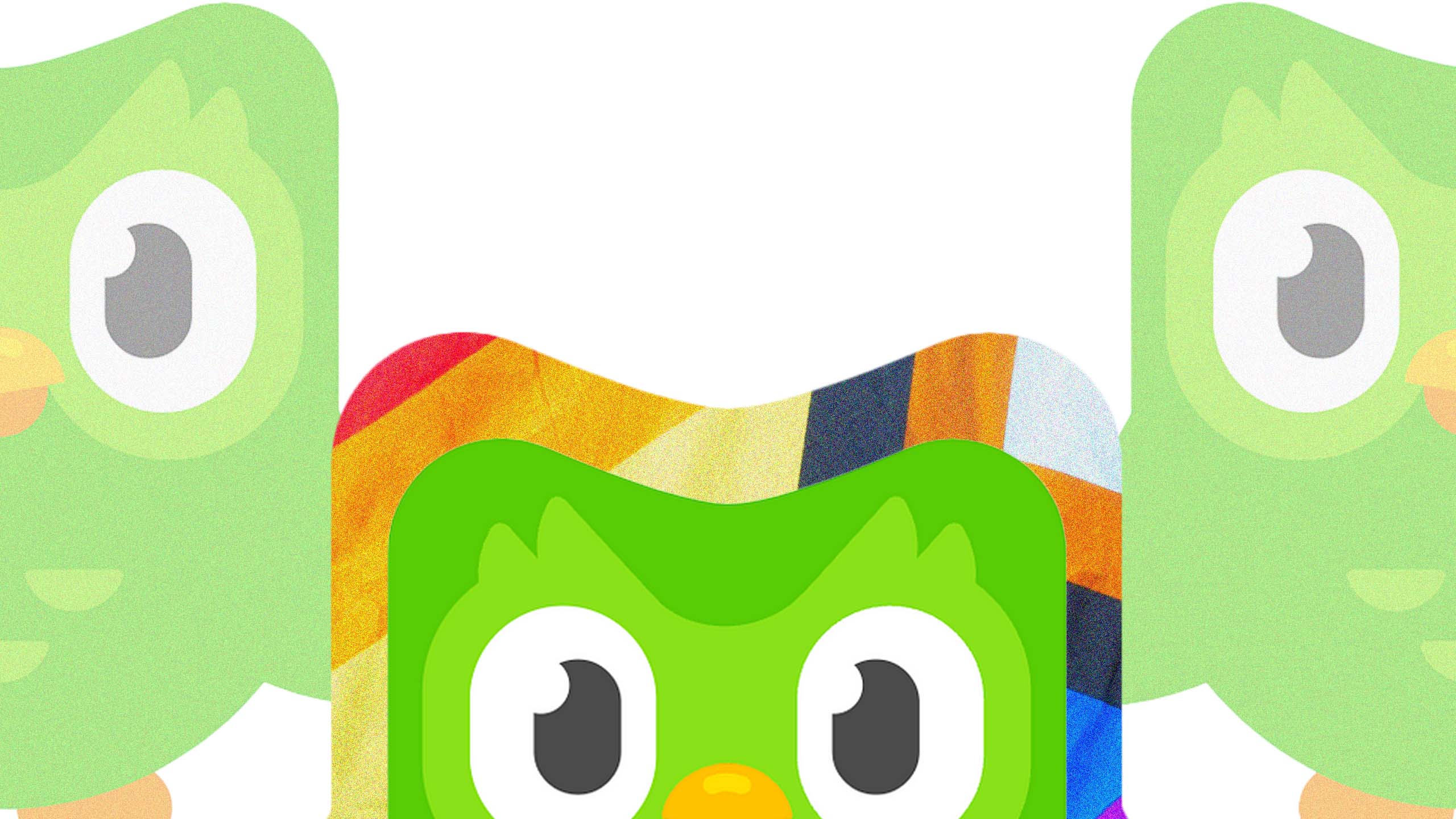Furry green owls have taken over my feed. Maybe you’ve come across them too. In one TikTok video, Charli XCX looks out at the crowd on her Sweat Tour’s opening night before singing, “Duolingo right there, baby,” right into the microphone. The camera pans to an audience where dozens of attendees are sporting masks of Duo—the lime-green owl mascot of the popular language-learning app Duolingo. The same masks went viral a few weeks earlier when worn by a group of shirtless gym bros on the streets of New York. This parliament of strigiform jocks (we’re leaning hard into the avian references here) was part of a pop-up event that Duolingo hosted in August. Clips like these document just the latest offerings from the educational technology company, whose strange yet wholly welcome marketing campaigns have been getting increasingly bizarre—and increasingly queer.
Duolingo was created in 2011 by Severin Hacker, who was at that time a graduate student at Carnegie Mellon University, and his then advisor Luis von Ahn (the inventor of captchas, those warped-text tests that ask you to prove you’re human). They pride themselves on being free to use, although Duolingo also offers subscription services. The company also foregrounds their approach to diversity in all of their outward-facing materials—celebrating, as they’ve said, “all gender identities, sexual orientations and backgrounds,” across both their social media marketing as well as their actual language lessons, something I noticed nearly as soon as I downloaded the app a decade ago.
Here, I should point out that I’m an avid user of the platform myself, having recently passed a 300-day streak on my Spanish lessons (not to brag). Still, the queer visibility embedded in these lessons often catches me off guard in a fun and surprising way. Just last week, an image of two women camping appeared in my lesson. According to the sentence I was prompted to form, the women were girlfriends. Their relationship was by no means the focus of the lesson (it was on subjunctive mood), and yet I’m still thinking about this small offering of representation days later.
Of course, I’m not the only one who finds these subtle inclusions worthwhile. Reddit is full of threads on the topic. Posts on X frequently capture users’ lessons that include same-sex couples and queer families. Even Duolingo’s own socials are full of compilations documenting these examples. The company’s posts are also where the queer meets the absurd, as seen with the hunky Duos running around TikTok.
Following Musk’s takeover of X, Duolingo tweeted that they’d be migrating to Tumblr, and while this has largely proven true—the company’s presence on X waning since late 2022—they pop on every now and then to post questions like “Why do I have to work eight hours straight instead of eight hours gay?” and share yassified listings of days of the week. Many of the company’s earlier posts functioned as more straightforward gestures toward inclusivity. In 2019, for instance, they posted a YouTube video featuring a gay couple’s experience navigating language barriers. Yet, more and more of their recent posts—which fangirl over Glen Powell, ship Duo with Barney the Dinosaur and even showcase the owl’s butt in a five-second Super Bowl ad—are so absurd that they’re beginning to feel like a Saturday Night Live parody.
According to the company’s blog, their efforts for inclusion are sincere. In one post, Emily Chiu, a senior creative producer at Duolingo, observed that the company’s cast of LGBTQ+ characters (which include a lesbian woman, a bisexual woman and a gay man) and the frequent queer narratives that appear in the app’s lessons are both an internal commitment to include diverse representation and an external commitment to their queer users. “Something really unique about Duolingo is the extremely vast and diverse audience for our content,” writes Chiu. “With such a broad base of learners, we have a responsibility to reflect and relate to the experiences of all kinds of people, LGBTQ2S+ folks included.” The idea that learners will find content more engaging if they’re able to see themselves reflected in it is one that’s existed since at least the 1990s, when it was popularized by foundational scholars like Rudine Sims Bishop. Despite embracing this idea, Duolingo has yet to incorporate any lessons that feature trans or genderqueer individuals—although one of their recent blog posts does address “neopronouns” and the ways in which languages from around the world are evolving.
It’s worth noting as well that this commitment toward inclusion has received pushback from more conservative factions. A homeschool vlogger, for instance, took umbrage with the app’s inclusive pedagogy, saying that their references to “lesbians going on honeymoons and homosexual couples meeting the family” were “inappropriate.” Annoying as that limited scope on education is, Duolingo faced greater concerns over the summer when Russia threatened to ban the app if the company didn’t remove references to what they deemed “LGBT propaganda.” Ultimately, Duolingo did comply with Russia’s orders—although they issued a statement to the Advocate alongside this decision that reaffirmed the company’s support of queer rights and “normalizing LGBTQ+ representation,” referring to the content ban as an “unfortunate” turn. Then again, they must be doing something right if intolerant individuals and governments alike are taking notice.
All the same, it’s strange that a company aiming to “normalize” queerness in their lessons is sensationalizing it in their social media feeds—framing references in such bizarre ways as to invoke Poe’s Law (the age-old internet adage that suggests it’s often impossible to tell whether someone online is being sincere or satirical). While it might be chalked up to the fact that it’s more difficult to stand out on a TikTok feed than in a language lesson, both Duolingo’s social media marketing strategy and their actual app seem to take advantage of a learning strategy that the company frequently exploits. It’s a concept called “reward prediction errors,” and it refers to the hit of dopamine that we get when what we encounter differs from what we expect (or predict). In completing my language lesson, for instance, I’m not expecting to find a cute story about girlfriends camping. When that’s what I do come across, however, it produces a hit of dopamine. And that dopamine—neuroscientists say and Duolingo programmers hope—will hold my attention and keep me invested in learning. Encountering a post in which Duo does his best impression of an intolerant Karen works in much the same way. I’m not expecting it, so when I stumble upon it, I find a similar dopamine hit, something to keep me invested in my favourite feathered activist.
All this to say that Duolingo seems to know exactly what it’s doing in its queer-inclusive lessons and its even queerer marketing strategy. Maybe I love Duo because I’ve been trained to—a Pavlovian response to reward prediction errors. Or maybe I love him because of the fuckboy vibes he’s broadcasting over TikTok. Either way, our daily streak keeps growing.


 Why you can trust Xtra
Why you can trust Xtra


